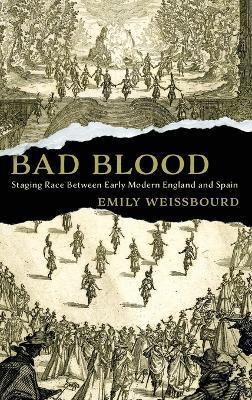Bad Blood: Staging Race Between Early Modern England and Spain

Bad Blood: Staging Race Between Early Modern England and Spain
Bad Blood explores representations of race in early modern English and Spanish literature, especially drama. It addresses two different forms of racial ideology: one concerned with racialized religious difference--that is, the notion of having Jewish or Muslim "blood"--and one concerned with Blackness and whiteness. Shakespeare's Othello tells us that he was "sold to slavery" in his youth, a phrase that evokes the Atlantic triangle trade for readers today. For many years, however, scholars have asserted that racialized slavery was not yet widely understood in early modern England, and that the kind of enslavement that Othello describes is related to Christian-Muslim conflict in the Mediterranean rather than the rise of the racialized enslavement of Afro-diasporic subjects.
Bad Blood offers a new account of early modern race by tracing the development of European racial vocabularies from Spain to England. Dispelling assumptions, stemming from Spain's historical exclusion of Jews and Muslims, that premodern racial ideology focused on religious difference and purity of blood more than color, Emily Weissbourd argues that the context of the Atlantic slave trade is indispensable to understanding race in early modern Spanish and English literature alike. Through readings of plays by Shakespeare, Lope de Vega, and their contemporaries, as well as Spanish picaresque fiction and its English translations, Weissbourd reveals how ideologies of racialized slavery as well as religious difference come to England via Spain, and how both notions of race operate in conjunction to shore up fantasies of Blackness, whiteness, and "pure blood." The enslavement of Black Africans, Weissbourd shows, is inextricable from the staging of race in early modern literature.PRP: 483.08 Lei
Acesta este Prețul Recomandat de Producător. Prețul de vânzare al produsului este afișat mai jos.
434.77Lei
434.77Lei
483.08 LeiIndisponibil
Descrierea produsului
Bad Blood explores representations of race in early modern English and Spanish literature, especially drama. It addresses two different forms of racial ideology: one concerned with racialized religious difference--that is, the notion of having Jewish or Muslim "blood"--and one concerned with Blackness and whiteness. Shakespeare's Othello tells us that he was "sold to slavery" in his youth, a phrase that evokes the Atlantic triangle trade for readers today. For many years, however, scholars have asserted that racialized slavery was not yet widely understood in early modern England, and that the kind of enslavement that Othello describes is related to Christian-Muslim conflict in the Mediterranean rather than the rise of the racialized enslavement of Afro-diasporic subjects.
Bad Blood offers a new account of early modern race by tracing the development of European racial vocabularies from Spain to England. Dispelling assumptions, stemming from Spain's historical exclusion of Jews and Muslims, that premodern racial ideology focused on religious difference and purity of blood more than color, Emily Weissbourd argues that the context of the Atlantic slave trade is indispensable to understanding race in early modern Spanish and English literature alike. Through readings of plays by Shakespeare, Lope de Vega, and their contemporaries, as well as Spanish picaresque fiction and its English translations, Weissbourd reveals how ideologies of racialized slavery as well as religious difference come to England via Spain, and how both notions of race operate in conjunction to shore up fantasies of Blackness, whiteness, and "pure blood." The enslavement of Black Africans, Weissbourd shows, is inextricable from the staging of race in early modern literature.Detaliile produsului













